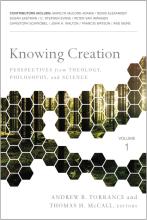Andrew B. Torrance and Thomas H. McCall, eds, Knowing Creation, Perspectives from Theology, Philosophy, and Science, 1 (Grand Rapids, Michigan: Zondervan, 2018)
Torrance, Andrew B., and Thomas H. McCall, editors. Knowing Creation. Perspectives from Theology, Philosophy, and Science, 1. Grand Rapids, Michigan: Zondervan, 2018.
Vol. 1 in the series "Perspectives from Theology, Philosophy, and Science." See Christ and the Created Order (#2018-PTPS-2) for Vol. 2.
"The editors would like to thank the John Templeton Foundation for its generous support of the Scientists in Congregations Scotland program, and the Templeton Religion Trust for its generous support of The Creation Project. It is out of these two programs that this volume has been developed."
Thomas F. Torrance is cited or discussed on pp. 60, 76, 94, and 96. These chapters are indicated in bold in the Contents below.
It is hard to think of an area of Christian theology that provides more scope for interdisciplinary conversation than the doctrine of creation. This doctrine not only invites reflection on an intellectual concept: it calls for contemplation of the endlessly complex, dynamic, and fascinating world that human being inhabit. But the possibilities for wide-ranging discussion are such that scholars sometimes end up talking past one another. Productive conversation requires mutual understanding of insights across disciplinary boundaries. Knowing Creation offers an essential resource for helping scholars from a range of fields to appreciate one another's concerns and perspectives. In so doing, it offers an important step forward in establishing a mutually-enriching dialogue that addresses, amongst others, the following key questions:
- Who is the God who creates?
- Why does God create?
- What is "creation"?
- What does it mean to recognize that a theology of creation speaks of a natural world that is subject to the observation of the natural sciences? What does it mean to talk about both a "natural" order and a "created" order?
- What are the major tensions that have arisen between the natural sciences and Christian thinking historically, and why? How can we move beyond such tensions to a positive and constructive conversation, while also avoiding facile notions such as a "god of the gaps"?
- Is it feasible for a natural scientist to maintain a belief in God's continuing creative activity?
- In what ways might a naturalistic understanding of the natural world be said to be limited?
- How can biblical studies, theology, philosophy, history, and science talk better together about these questions?
At a time when the doctrine of creation - and even a mention of "creation" - has been disparaged due to its supposed associations with anti-scientific dogma, and theological offerings sometimes risk appearing a little more than reactionary exercises in naive apologetics, ill-informed by science or distinctly wary of engagement with it, it is more important than ever to offer a cross-disciplinary resource that can voice a positive account of a Christian theology of creation, and do so as a genuinely broad-ranging conversation about science and faith.
"Introduction: Knowing Creation," Andrew B. Torrance and Thomas H. McCall
I. Theological Perspectives
1. Simon Oliver, "Every Good and Perfect Gift Is From Above: Creation Ex Nihilo before Nature and Culture" (27-46)
2. Christoph Schwöbel, "'We Are All God's Vocabulary': The Idea of Creation as a Speech-Act of the Trinitarian God and Its Significance for the Dialogue between Theology and Sciences" (47-68)
3. Randall C. Zachman, "Why Should Free Scientific Inquiry Matter to Faith? The Case of John Calvin" (69-86)
4. Andrew B. Torrance, "Not Knowing Creation" (87-105); #2018-ABT-1
II. Biblical and Historical Perspectives
5. John H. Walton, "Origins in Genesis: Claims of an Ancient Text in a Modern Scientific World" (107-122)
6. Francis Watson, "How Did Genesis Become a Problem? On the Hermeneutics of Natural Science" (123-140)
7. William P. Brown, "Knowing Creation in the Light of Job and Astrobiology" (141-154)
8. Susan Grove Eastman, "Knowing and Being Known: Interpersonal Cognition and the Knowledge of God in Paul's Letters" (155-169)
III. Philosophical Perspectives
9. Marilyn McCord Adams, "Sanctifying Matter" (171-180)
10. Peter van Inwagen, "The Vision of the Hazelnut" (181-194)
11. C. Stephen Evans, "Are We Hardwired to Believe in God? Natural Signs for God, Evolution, and the Sensus Divinitatus" (195-214)
12. Robert C. Koons, "Knowing Nature: Aristotle, God, and the Quantum" (215-236)
IV. Scientific Perspectives
13. William M. R. Simpson, "Knowing Nature: Beyond the False Dilemma of Reduction or Emergence" (237-260)
14. Denis R. Alexander, "Creation, Providence, and Evolution" (261-286)
15. Mark Harris, "'The Trees of the Field Shall Clap Their Hands' (Isaiah 55:12): What Does It Mean to Say That a Tree Praises God?" (287-304)
16. Tom McLeish, "The Science-and-Religion Delusion: Towards a Theology of Science" (305-326)
- Oklahoma History of Science Collections copy donated by Andrew Torrance.
- 114 views

